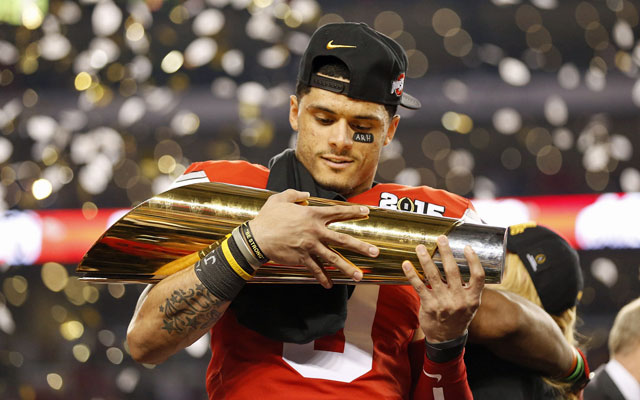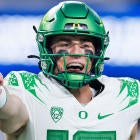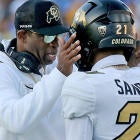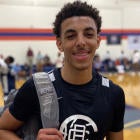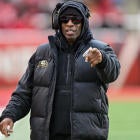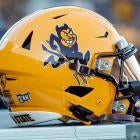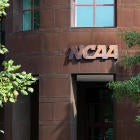Every Tuesday in November, we’re privy to one of the most hotly contested debates in college sports: Which four teams are deserving of the top spots in the College Football Playoff Rankings? Thankfully, most unveilings are just dress rehearsals, inciting mini-riots among fan bases and giving journalists plenty of fodder for stories and column.
In order to create an equal playing field, there needs to be a quantitative element to balance out former coaches and athletic administrators. What better way to bridge the gap between eye test and proper valuation than including an oddsmaker on the CFP Selection committee itself.
“There is no doubt in my mind that an oddsmaker would be a great addition to the College Football Playoff Committee," said Peter Burns, an anchor on SEC Network. "I've been saying that for several years. There is a bias in college football, especially with a committee whose average age is 57 after decades of being exposed to the bigger 'brands' of and the older 'styles' of football.”
The list of current committee members includes the following names devoid of one important attribute: youth.
Jeff Long -- Chairman -- Vice Chancellor and Director of Athletics, Arkansas
Barry Alvarez -- Director of Athletics, Wisconsin (former coach)
Mike Gould -- Lieutenant General (ret.); former Superintendent of the US Air Force
Kirby Hocutt -- Director of Athletics, Texas Tech
Tom Jernstedt -- Former NCAA Executive Vice President
Bobby Johnson -- Former coach, Vanderbilt
Tom Osborne -- Director of Athletics, Nebraska (former football)
Dan Radakovich -- Director of Athletics, Clemson
Condoleeza Rice -- Professor, Stanford; former US Secretary of State
Mike Tranghese -- Former Big East Commissioner
Steve Wieberg -- Former college football reporter
Tyrone Willingham -- Former coach
“I do agree that the average age of committee members skews older. Having some younger members who perhaps view the sport differently could help," said CBS Sports national college football writer Jon Solomon. "If the committee members want to use gambling odds in evaluating teams, there's nothing stopping them right now from doing so. They just wouldn't say so publicly."
Now ask yourself this question: Can a group with clear ties to the Power Five conferences and their member institutions approach selecting a field without bias? I’d have to imagine their daily responsibilities preclude them from watching a fraction of the football senior oddsmakers do in determining the most “deserving” programs. This isn’t a knock on the credentials these men and women are tasked with, but blood is thicker than water; if their schools benefit financially from certain decisions, no one will fault them for entering the room with partisan tendencies.
“They would never allow an oddsmaker on the committee, but if they did, it would give them all a much different perspective in the room that they don’t currently have," said Brett McMurphy, a college football insider at ESPN. "Essentially, that’s what they were using in the BCS. Those computer rankings were basically someone’s version of power ratings, so technically they have used computer 'oddsmakers' in the past already.”
McMurphy makes a great point and poses a bigger philosophical question: How has a quantitative element been left out of the process to this point? The idea that an "eye test" can be the ultimate determining factor is ridiculous with a room that can’t honestly say they’re able to watch every single team being considered every single Saturday during the fall. Think about the same parallel in professional sports: Completely ignoring advanced analytics in favor of old school scouting that became extinct with the flip phone.
For me, an oddsmaker’s greatest value could come in the event there's no discernible edge between Team A and Team B in a blind test. There’s a careful balancing act the member committee needs to take into account. Are they after the best teams, the most deserving or a combination of the two? College football fans deserve the later, but I get the feeling "most deserving" becomes an easy crutch to use when traditional powers need that extra boost.
“The definition of 'best' is always a conversation this time of year and people have a hard time understanding a team with a loss could be better than an undefeated team," said Chris Fallica of ESPN Stats & Information (also known as the "Bear" on College GameDay). "There are some great power ratings and metrics out there now which could be of use, but the committee doesn't use them. And as a result, the 'most deserving' argument prevails."
Bear’s assessment is completely accurate. Even the subtle insinuation that Iowa -- due to its unblemished record -- belongs in the same conversation as Alabama, Ohio State or even Stanford is preposterous. This is where the committee needs to use common sense by rewarding teams that play difficult schedules, or the end result is a college football landscape littered with nonconference layups and unbalanced conference schedules creating a true apples-to-oranges comparison.
“Inclusion of an oddsmaker would add to the process a nonpartisan college football expert devoid of affiliations or external agendas. An oddsmaker could provide the committee a ranking that is more objectively quantified," explained Scott Cooley, an oddsmaking consultant for Bookmaker. "Who do you think watches more college football and analyzes more teams during any given season? An oddsmaker, who’s job depends on the accuracy of predictions, or the athletic director who eats and breathes big-boy football?”
Like myself, Cooley comes from an oddsmaking background; we believe in the value of the craft and that most rational individuals should see the diverse element oddsmaker power ratings add to the process. Making room for a Vegas-style power rating profile would assist committee members immensely when trying to figure out how to differentiate teams. I’ve seen first-hand the painstaking effort employed by the best oddsmakers in the business, those which grade every single player on every single team.
“Oddsmaker addition to the committee is 100 percent necessary. In fact, I'll even go a step further: I think Vegas oddsmakers should pick the playoff field,” said Clay Travis, founder of Outkick the Coverage and a Fox Sports contributor.
While a number of trusted voices in college football feel an oddsmaker adds a valuable element to the process, there is a school of thought that says maybe it’s not entirely in the sport’s best interest.
“I don’t think it would be a good idea at all. USC, for example, has lost several games as a double-digit underdog and probably would be significant favorites over several top 15 teams but simply don’t deserve -- based on what they’ve done this season -- to be [ranked] higher,” said Fox Sports columnist Bruce Feldman.
Feldman is right in his concern that teams with multiple losses could end up in the field if oddsmakers chose the best four teams. But even Vegas wouldn’t want to see 8-4 teams fighting it out for a national championship, meaning an equation between on field accomplishments, resume and power profile could be used to factor in the most important elements.
We all know college football isn’t turning to Vegas to fix its problems. It’s an interesting debate that will continue to rage on until there is a simple -- and clear -- solution for identifying and choosing the top four teams in the land each December.
Todd Fuhrman arrived at SportsLine with an extensive resume in the sports gambling industry. Fuhrman got his start at Caesars Palace as a financial analyst back in 2005 before transitioning into sportsbook operations full time. Since his departure from the Palace back in 2011, he's experienced a meteoric rise as a gambling insider and trusted voice in the field. During his previous stint at Fox Sports, he covered every sport with a point spread ranging from college and pro football to NASCAR and soccer. Follow him on Twitter @ToddFuhrman.
